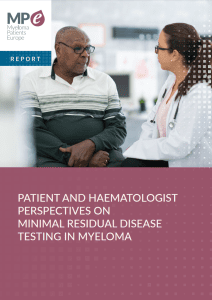Minimal residual disease (MRD) – also called measurable residual disease – refers to a very small number of cancer cells that remain in the body during or after treatment.
MRD testing uses advanced laboratory methods that can find one cancer cell among one million normal cells. A positive MRD test result indicates that cancer cells were identified, even at very minute levels, whereas a negative MRD result indicates that cancer cells were not identified.
Whilst there are a wide range of scientific articles exploring the application and use of MRD, there are a very limited number of studies assessing the qualitative perspectives of patients and clinicians on the current and potential impact of MRD.
Therefore, MPE designed this research project to understand the patient and clinician experience and perspectives of MRD and its potential use in the real-world.
It explored current and future uses of MRD and how understanding and expectations of its potential align or vary between patients and clinicians and also gathered perspectives on the use of MRD as a surrogate endpoint in clinical trials and in regulatory and reimbursement decisions.
Following recommendations from our report, MPE has set out to create educational materials as a first output of this project. This includes an animated video and Q&A document on the most important things patients need to know about MRD.
Check out the research report and educational materials below and in our MRD virtual room here.


